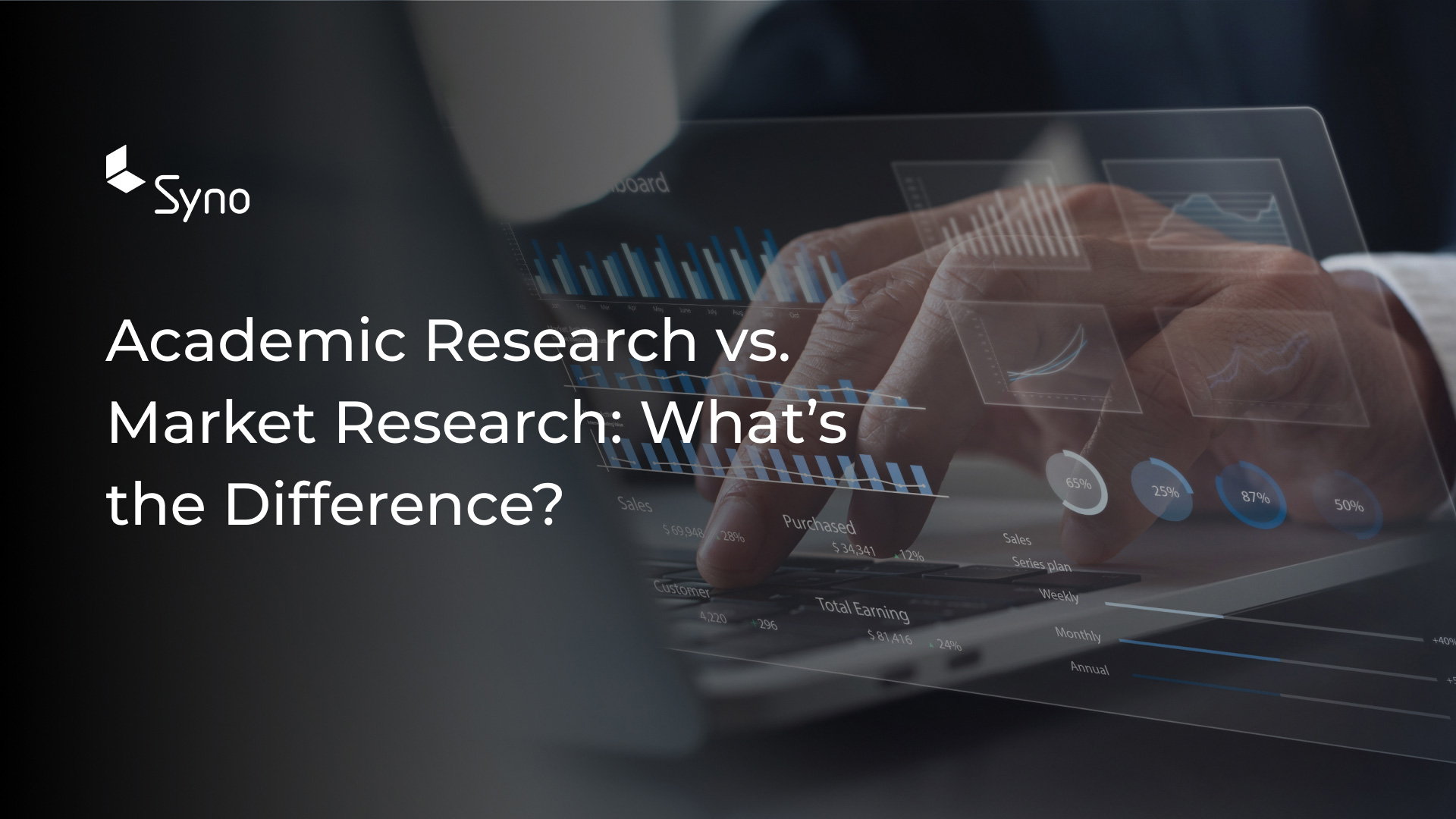
Academic Research vs. Market Research: What’s the Difference?
The word “research” can mean different things depending on who’s doing it and why. At Syno International, we support both academic institutions and commercial clients, but the way they conduct and use research often differs in meaningful ways.
If you’ve ever wondered about the difference between academic research and market research, this article breaks it down clearly. We’ll explore their goals, timelines, methods, and more, with simple examples to make things easier to understand.
Whether you’re a university researcher or business professional, understanding these differences can help you choose the right approach for your next project.
What is Academic Research?
Academic research is conducted within universities and other educational institutions. It’s driven by the desire to expand knowledge, test theories, and contribute to scholarly discussion, rather than solve a business problem.
Key traits of academic research:
- Aims to explore theories and generate new knowledge
- Typically funded by universities or research grants
- It can take months or even years to complete
- Usually shared in academic journals or public platforms.
What is Market Research?
Market research, on the other hand, is used by companies and organizations to better understand consumers, markets, or business environments. It helps brands make smarter decisions - whether they’re launching a new product, testing a message, or tracking brand awareness.
Key traits of market research:
- Focused on business goals and decision-making
- Designed to deliver fast, actionable insights
- Often completed within days or weeks
- Typically kept confidential and used internally
- More flexible in terms of methods and scope.
Academic Research vs. Market Research: 5 Key Differences
Let’s explore the main differences between these two types of research, with simple examples to make each point clear.
1. Purpose and Goals
Academic Research Example:
A university team conducts a study on how access to green public spaces affects mental health in rural areas. Their goal is to contribute to public health policy and academic understanding.
Market Research Example:
A wellness brand surveys people in small towns to find out which gestures they want in a new app for outdoor exercise tracking. Their goal is to tailor the product to local users' needs.
Takeaway:
Academic research is driven by theory and exploration. Market research is driven by practical business outcomes.
2. Timelines and Speed
Academic Research Example:
A graduate student plans a six-month-long study, collecting survey data from multiple countries and submitting results to peer review.
Market Research Example:
A company runs a quick online survey over three days to compare three versions of a homepage layout.
Takeaway:
Academic research follows longer, structured timelines, while market research is typically fast and flexible.
3. Methods and Rigor
Academic Research Example:
A project follows a standardized methodology, receives ethical approval, and includes detailed documentation for replication.
Market Research Example:
A marketing team chooses a quick-turn survey with 500 respondents based on key demographics, prioritizing speed and cost-efficiency.
Takeaway:
Academic research focuses on methodological rigor and replicability. Market research is adaptable and results-oriented.
4. Audiences and Outcomes
Academic Research Example:
Results are published in academic journals, used in lectures, or cited in policy discussions.
Market Research Example:
Findings are shared internally with product and marketing teams to prepare for future campaigns.
Takeaway:
Academic research targets the academic and public community. Market research supports internal business decisions.
5. Ethics and Data Use
Academic Research Example:
Researchers follow strict ethical protocols, anonymize data, and submit to an institutional review board.
Market Research Example:
Data collection is privacy-compliant (e.g., GDPR) and used for insights without needing academic oversight.
Takeaway:
Both follow ethical standards, but academic research is more formalized, while market research is compliance-focused.
Where the Two Can Work Together
Academic and market research are different, but not in conflict. In fact, they can complement each other:
- Academic studies often inform long-term strategy and policy
- Market research can build on academic findings to shape campaigns or services
- Researchers from both sides can collaborate to design better questions, collect higher-quality data, and understand broader contexts.
Know Which Research Approach Fits Your Needs
Both academic and market research have their place, and both are valuable. The key is understanding:
- What are you trying to learn?
- Who will use the results?
- How quickly do you need the answers?
If you aim to test a theory or contribute to broader knowledge, academic research is the way to go.
If you need clear, fast insights to guide a business decision, market research is your best fit.
How Syno International Supports Both
At Syno, we work with:
- Universities and academic institutions conducting global studies with specific sampling needs
- Businesses and agencies seeking real-time insights from targeted audiences.
Our platform and services include:
- Global online survey distribution in over 100 countries
- Access to detailed demographic and profiling filters
- Support with survey design, scripting, extra customisation, and data collection
- GDPR-compliant and ISO/IEC 27001:2022-certified data protection
- Flexible options: DIY tools or full-service project management.
Whether your project is about publishing in a journal or optimizing a campaign, our tools and team are here to support your goals.